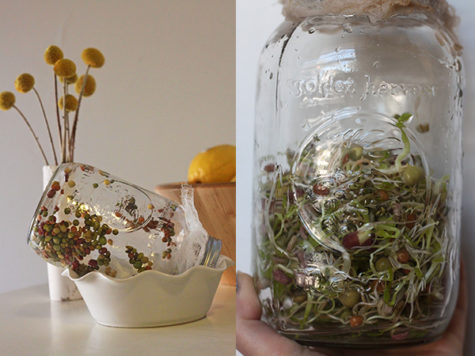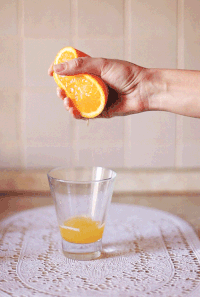How To Make Sprouts
Use one part seed to at least three parts water. Soak in a wide-mouth jar. All measurements below yield one quart of ready sprouts. Half-gallon or larger jars are more convenient.
- 1 cup aduki beans – soak 12 hours – 3 to 5 days to sprout
- 2 tablespoons alfalfa seed – soak 6 hours – takes 5 to 6 days to sprout
- 2 tablespoons red clover seed – soak 6 hours – takes 5 to 6 days to sprout
- 1/2 cup fenugreek – soak 8 hours – 3 days to sprout
- 1 cup garbanzo beans – soak 12 hours – 3 to 5 days to sprout
- 1 cup legumes – soak 12 hours – 3 to 5 days to sprout
- 1/2 cup lentils – soak 8 hours – 3 days to sprout
- 1/2 cup mung beans – soak 8 hours – 3 to 5 days to sprout
- 1/4 cup mustard seed – soak 6 hours – takes 5 to 6 days to sprout
- 1/4 cup radish seed – soak 6 hours – takes 5 to 6 days to sprout
- 1 cup rye – soak 12 hours – 3 days to sprout
- 1 cup soy beans – soak 12 hours – 3 to 5 days to sprout
- 2 cups sunflower seeds – soak 12 hours – 2 days to sprout
- 1 cup wheat – soak 12 hours – 3 days to sprout
Instructions:
Cover the mouth of the jar with a plastic or stainless steel sprouting screen or cheesecloth, which is tied on or secured with a rubber band (sprouting jars, bags, and automatic sprouting machines are also available).
After soaking seeds for the prescribed amount of time, drain well, and keep in a warm (65 degree F) dark place. They can be covered with a cloth or bag. Sprouting time increases with more light and cooler conditions.
Rinse twice a day, ideally morning and evening. An exception is soy, which may rot if not rinsed four times daily. Keep jar tilted mouth down for better drainage. A dish drainer works well for this. Thorough rinsing and complete draining improve sprout flavor.
After three days place alfalfa, red clover, radish, and mustard sprouts in a cool place with indirect sunlight to induce chlorophyll. Continue rinsing twice daily until sprouts are ready.
Radish and mustard seed sprouts exhibit biting pungency, which adds a delightful zesty quality when mixed with other sprouts or in various dishes.
During the sprouting process, the hulls on certain seeds slough off. It is important to remove hulls from alfalfa and radish sprouts since these easily rot. Hulls from mung, aduki, and fenugreek are often removed for a lighter-tasting quality, although they can be eaten and provide fiber.
To remove the loose hulls from sprouts, place them in a large bowl of water and agitate them, further loosening and brushing them aside. Gently reach under the sprouts and lift them out of the water, without disturbing the sunken hulls, which can then be discarded.
Drain sprouts well. If refrigerated, they keep up to one week in a plastic bag or covered glass jar.
Note:
Alfalfa may not sprout in polluted tap water. Use distilled or spring water or sprout with other seeds (mung, lentil, fenugreek) in the same jar. You will have a delicious salad. Save all rinse water for cooking, watering plants, or to give your animals.
From: Healing With Whole Foods




Leave a Reply